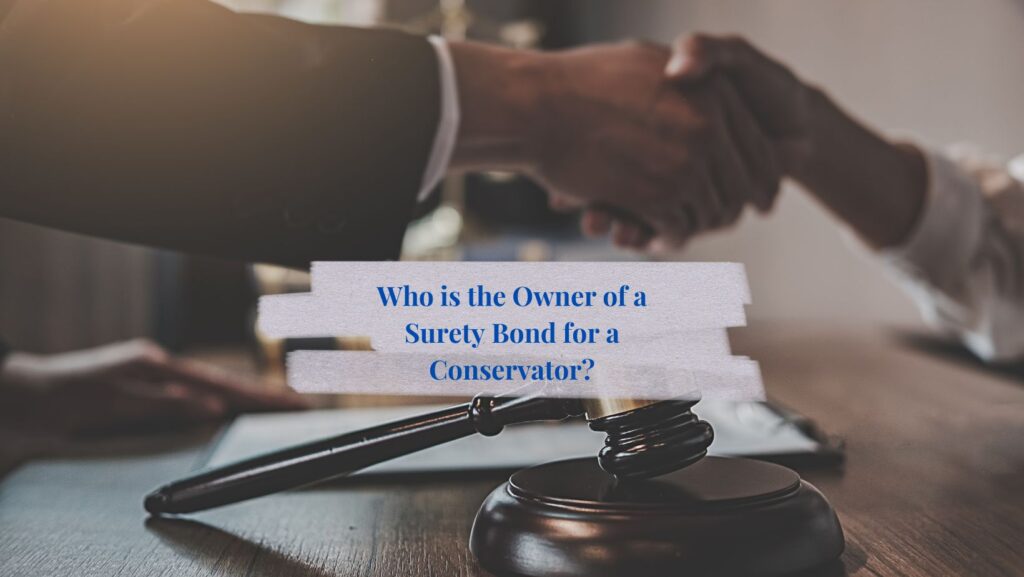When a conservator is appointed by the court, a surety bond is usually required. This bond protects the interests of the conservatee and ensures that the conservator will properly carry out their duties. So who is the owner of this bond?

What is a Conservatorship Bond?
A Conservatorship Bond is a legal bond that provides protection for an incapacitated person, known as the conservatee. A Conservatorship Bond ensures that the conservator, or guardian of the conservatee’s assets and financial matters, will act by all applicable laws, rules, and regulations as outlined by state courts and/or statutes. The bond acts as insurance for the conservatee, providing financial protection if the conservator wrongfully manages his or her financial affairs. A Conservatorship Bond is typically required by a state court when appointing a conservator to protect the interests of an incapacitated person.
Who are the parties involved in a Conservatorship Bond?
A Conservatorship Bond involves three parties: the conservator, the ward, and the surety. The conservator is a court-appointed individual responsible for managing financial matters on behalf of an incapacitated person (the ward). The surety is the entity that issues the bond to guarantee that the conservator will fulfill his or her duties ethically and honestly.
Who should get a Conservatorship Bond?
A Conservatorship Bond is typically for those who are elderly or incapacitated and need a financial guardian to manage their assets. This bond protects their finances from misuse, theft, and other harm that could occur if their money were not properly managed. It also safeguards the conservator from personal liability in managing the funds of another person.
Who is the owner of a Surety Bond for a Conservator?
The owner of a surety bond for a conservator is typically the court or other governmental body that appoints the conservator. The purpose of the surety bond is to protect both creditors and beneficiaries in estate matters. The surety bond is meant to ensure that the appointed conservator properly manages assets, pays debts, and follows all instructions given by the court.
Who decides if a conservatorship is needed?
Generally, the court will appoint a conservator if they believe that it is necessary to protect an individual who is unable to manage their affairs due to disability or age. A conservator can be appointed by the court upon application of any interested party such as family members, friends, a doctor, or a social service agency.
What makes a Conservatorship Bond necessary?
A conservatorship bond, also known as a guardian bond, is an essential part of the court process when a person needs assistance with financial or medical affairs. This type of surety bond ensures that the conservator will be financially responsible and act by state laws and court orders.
The protection offered by Conservatorship Bonds
The protection offered by Conservatorship Bonds is extensive and helps to provide peace of mind to those who purchase them. The bond is a guarantee that the principal amount or face value of the bond will be repaid in full when it reaches maturity. In addition, this type of bond guarantees that the interest payments on the bond will be made as scheduled throughout its life. Conservatorship Bonds also protect from default or insolvency. This means that if the issuer of the bond were to become insolvent, the bondholders would still be able to get their money back.
What is a Surety Bond Company’s responsibility when it comes to Conservatorship Bonds?
The Surety Bond Company plays an important role in the process of obtaining a Conservatorship Bond. The bond is meant to guarantee that all funds entrusted to the conservator are used only for the benefit of the person or estate they are designated for, and not misappropriated or otherwise taken advantage of.
What is the estimated price of a Conservatorship Bond?
The cost of a Conservatorship Bond is dependent on the value of the estate being protected and the particular state in which it is filed. Generally speaking, these bonds range from $500 to $10,000. The bond amount must be established by a court order before its issuance. Additionally, the cost of a Conservatorship Bond could include an underwriting fee, which is generally around 10% of the bond amount. In some cases, bonds may require greater underwriting fees due to additional risk factors.
How to get a Conservatorship Bond?
The process of obtaining a Conservatorship Bond will vary depending on the state and type of bond required. Generally, applicants will need to complete an application form with their personal information, including information about their financial situation and any criminal history. They may also be asked to provide additional supporting documents, such as court orders or proof of guardianship.